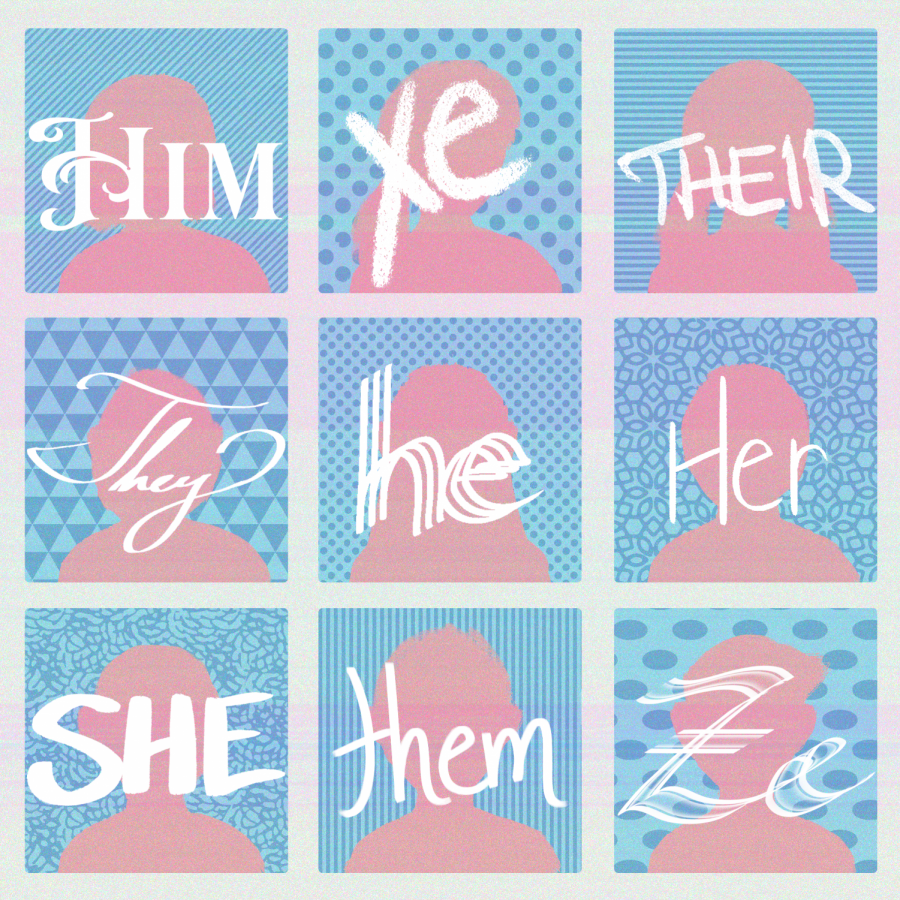Online learning facilitates conversation on disclosing gender pronouns
October 14, 2020
In recent years, stating one’s gender pronouns has become a larger part of daily life. Social media bios and email signatures now often contain personal information such as “she/her/hers” or “they/them/theirs.” In group settings, it is becoming more common for people to introduce themselves with not only their name, but also what gender pronouns they use.
A large part of the advocacy for normalizing pronoun disclosure allows pronouns to have a presence in the way people interact with one another, including the way students interact in the educational space.
Virtual learning has created new pathways for students to disclose their pronouns, such as displaying them under their Zoom names or email signatures.
“I think that having [pronouns] on your Zoom or your email signature is a step one,” said Sarina Loeb, the manager of CSUN’s Pride Center, who uses they/them/theirs and she/her/hers pronouns. “For some people, sharing their pronouns isn’t their everyday experience, so bringing that to the forefront by putting it on your Zoom or your email signatures is a start.”
Canvas, the learning management system used by CSUN, also allows users to select their pronouns in “User Settings,” which then displays a user’s pronouns after the display name. However, this setting must be enabled by the institution. This function is currently not enabled for CSUN students.
“My hope is that, in the near future, pronouns will be listed on class rosters and on Canvas,” Loeb said. “That is something we’ve been working for.”
Historically, pronouns that are used in a conversation to replace a person’s name have been closely tied to gender. Because of this, transgender and genderqueer people often disclose their pronouns so that others know how they wish to be addressed.
Many cisgender people, whose pronouns are likely to be accurately assumed by others, have also found reasons to include their pronouns when introducing themselves to others.
“A very common reason given for using pronouns is the idea of being in solidarity with trans and gender-nonconforming people,” said Alex Rice, a student in CSUN’s Master of Social Work program. Rice’s pronouns are they/them/theirs.
“It’s a privilege to have your gender identity match what other people perceive you as, so I think having everyone use pronouns is a great way of checking your privilege,” they said.
Lillian Beaudoin, whose pronouns are she/her/hers, is a member of the Queer Coalition of Social Workers, an on-campus organization at CSUN that works to empower LGBTQ people specifically related to the social work profession. As a cisgender person herself, Beaudoin advised other cisgender people to disclose their pronouns to others.
“It costs you nothing as a cis person to disclose your pronouns,” Beaudoin said. “You get to live in a place of privilege and power where that part of your identity isn’t suddenly called into question, and nothing about you has changed in the eyes of other people.”
Safety is a concern when it comes to trans and genderqueer people when revealing their pronouns to others.
“It depends on personal safety,” said Tanyx Madrigal, who is also a CSUN alumnus whose pronouns are they/them/theirs. “If I’m honest, if I’m just walking around, if I’m meeting new friends, and I’m not sure how they’re going to be, I don’t [reveal my pronouns] because it is scary.”
As pronouns become more normalized, Professor Sheena Malhotra, the director of CSUN’s Queer Studies program who uses she/her/hers pronouns, advised that pronoun sharing remain up to personal choice.
“We can model pronoun disclosure by sharing our own if we are comfortable doing so, but leaving it optional for others, highlighting that the point of the introductions is name-sharing, so no one feels forced,” she said.
Malhotra also encourages her fellow faculty members to pay close attention when a student discloses their pronouns. She encourages faculty to use those pronouns in all future interactions with the student.
As more CSUN students become aware of the issues surrounding pronouns, the choice of whether or not to disclose one’s pronouns may become commonplace in the near future.
